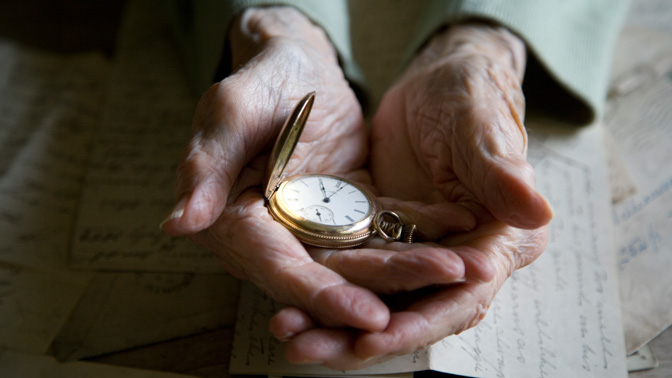Home page Description:
A new drug combination extends life for elderly people with brain cancer.
Posted On: March 17, 2017

Image Caption:
More than half of all glioblastoma patients are older than 65, highlighting the need to develop effective standards of therapy for this age group.
During the bustle of day-to-day life, time often seems to be in short supply. This takes on a more serious meaning for those diagnosed with a fatal disease such as glioblastoma, the most common brain cancer in adults. People with glioblastoma typically survive for less than two years; thus, therapeutic strategies to extend life—even for a short period—are of value.
For glioblastoma patients under 65 years of age, treatment comprises six weeks of radiation therapy plus an anti-cancer drug, temozolomide; however, this regimen is poorly tolerated by those over the age of 65. A shorter course of radiation therapy is effective for elderly patients, but the benefit of adding the drug to this regimen is not known.
To address this issue, a team of researchers—led by Drs. Normand Laperriere (Clinical Researcher, PM) and James Perry (Affiliate Scientist, Sunnybrook Research Institute) with 100 participating centres in Canada, Europe, Australia, New Zealand and Japan—evaluated the efficacy of a short course of radiation therapy with temozolomide in elderly glioblastoma patients. The research team recruited 562 patients between 65 and 90 years of age: one half received radiation therapy alone; and the other half received radiation therapy plus the drug. Those who received radiation therapy and the drug survived almost two months longer than those who received radiation therapy alone.
The team also noted that a subgroup of patients was particularly responsive to the drug: those with tumours that had a particular gene known as MGMT turned off survived almost twice as long with the new regimen. This marker could be used in the future to identify those that would especially benefit from this regimen.
"Until now, there has been no clear standard of care for treatment of glioblastoma in the elderly," explains Dr. Laperriere. "Our new regimen—which incorporates a drug that is easily taken in pill form—is clearly the most efficacious strategy tested to date, and we anticipate that it will be broadly adopted around the world."
Watch Dr. Laperriere discuss his work here.
This work was supported by the Canadian Cancer Society Research Institute, Schering-Plough (Merck & Co.), the European Organisation for Research and Treatment of Cancer and The Princess Margaret Cancer Foundation.
Perry JR, Laperriere N, O'Callaghan CJ, Brandes AA, Menten J, Phillips C, Fay M, Nishikawa R, Cairncross JG, Roa W, Osoba D, Rossiter JP, Sahgal A, Hirte H, Laigle-Donadey F, Franceschi E, Chinot O, Golfinopoulos V, Fariselli L, Wick A, Feuvret L, Back M, Tills M, Winch C, Baumert BG, Wick W, Ding K, Mason WP; Trial Investigators. Short-course radiation with temozolomide in elderly glioblastoma patients. New Engl J Med. 2017 Mar 16. doi: 10.1056/NEJMoa1611977.
For glioblastoma patients under 65 years of age, treatment comprises six weeks of radiation therapy plus an anti-cancer drug, temozolomide; however, this regimen is poorly tolerated by those over the age of 65. A shorter course of radiation therapy is effective for elderly patients, but the benefit of adding the drug to this regimen is not known.
To address this issue, a team of researchers—led by Drs. Normand Laperriere (Clinical Researcher, PM) and James Perry (Affiliate Scientist, Sunnybrook Research Institute) with 100 participating centres in Canada, Europe, Australia, New Zealand and Japan—evaluated the efficacy of a short course of radiation therapy with temozolomide in elderly glioblastoma patients. The research team recruited 562 patients between 65 and 90 years of age: one half received radiation therapy alone; and the other half received radiation therapy plus the drug. Those who received radiation therapy and the drug survived almost two months longer than those who received radiation therapy alone.
The team also noted that a subgroup of patients was particularly responsive to the drug: those with tumours that had a particular gene known as MGMT turned off survived almost twice as long with the new regimen. This marker could be used in the future to identify those that would especially benefit from this regimen.
"Until now, there has been no clear standard of care for treatment of glioblastoma in the elderly," explains Dr. Laperriere. "Our new regimen—which incorporates a drug that is easily taken in pill form—is clearly the most efficacious strategy tested to date, and we anticipate that it will be broadly adopted around the world."
Watch Dr. Laperriere discuss his work here.
This work was supported by the Canadian Cancer Society Research Institute, Schering-Plough (Merck & Co.), the European Organisation for Research and Treatment of Cancer and The Princess Margaret Cancer Foundation.
Perry JR, Laperriere N, O'Callaghan CJ, Brandes AA, Menten J, Phillips C, Fay M, Nishikawa R, Cairncross JG, Roa W, Osoba D, Rossiter JP, Sahgal A, Hirte H, Laigle-Donadey F, Franceschi E, Chinot O, Golfinopoulos V, Fariselli L, Wick A, Feuvret L, Back M, Tills M, Winch C, Baumert BG, Wick W, Ding K, Mason WP; Trial Investigators. Short-course radiation with temozolomide in elderly glioblastoma patients. New Engl J Med. 2017 Mar 16. doi: 10.1056/NEJMoa1611977.




